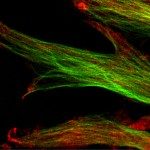Lien vers Pubmed [PMID] – 22262096
Microbiology (Reading, Engl.) 2012 Apr;158(Pt 4):886-95
In Escherichia coli, only one essential oligoribonuclease (Orn) can degrade oligoribonucleotides of five residues and shorter in length (nanoRNA). In Bacillus subtilis, NrnA and NrnB, which do not show any sequence similarity to Orn, have been identified as functional analogues of Orn. Sequence comparisons did not identify orn, nrnA or nrnB homologues in the genomes of the Chlamydia/Cyanobacteria and Alphaproteobacteria family members. Screening a genomic library from Bartonella birtlesii, a member of the Alphaproteobacteria, for genes that can complement a conditional orn mutant in E. coli, we identified BA0969 (NrnC) as a functional analogue of Orn. NrnC is highly conserved (more than 80 % identity) in the Bartonella genomes sequenced to date. Biochemical characterization showed that this protein exhibits oligo RNA degradation activity (nanoRNase activity). Like Orn from E. coli, NrnC is inhibited by micromolar amounts of 3′-phosphoadenosine 5′-phosphate in vitro. NrnC homologues are widely present in genomes of Alphaproteobacteria. Knock down of nrnC decreases the growth ability of Bartonella henselae, demonstrating the importance of nanoRNase activity in this bacterium.

